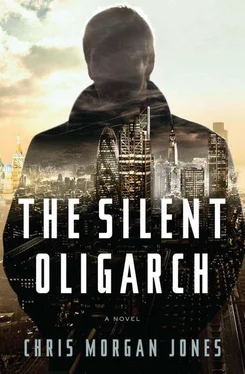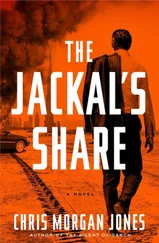“I’ll be wearing a suit. See you shortly.”
Webster turned and with new purpose walked north, looking over his shoulder for taxis. He called George, and Hammer, who was entertained.
“What are you planning to do with him?”
“Get him to see the light.”
Hammer laughed. “I’d say he’s already seen it.”
CHURCH STREET was five minutes north of Marylebone but somehow a different London altogether. This was a place where people lived rather than worked. It was lined with stalls selling fish in polystyrene boxes, fruit and vegetables in one-pound plastic bowls, women’s coats tightly packed on circular racks, floor polish and dish-washing liquid in plastic crates. One stall was given over to gloves in black leather or wool of every color, another to earrings and bracelets strewn across a table in cellophane packages like squares of ice. It was dry now but a cold wind blew steadily down the street and the market was quiet. Webster ducked between two stalls to the row of shops behind and found the café. Enzo’s Market Café. Its window frames were painted pale blue and chipped in places to a dull gray beneath, and in the windows themselves pictures of food, all yellows and oranges and reds, displayed what you could eat if you held your nerve and went in.
Inside, Enzo’s was thick with the smell of frying and old oil. Webster ordered himself a mug of tea, took it to a Formica table fixed to the far wall and sat facing the door, busying himself with his BlackBerry so that he would look occupied when Lock arrived. By the window an old man wearing a shapeless brown tweed jacket was closely inspecting a newspaper that he had spread out over the whole table; against the other wall, by the door, two women in thick quilted coats, propped up straight in their chairs, talked about the fortunes of the market. They were the only people there apart from the young man behind the till who looked as if he must be Enzo’s son. Lock would make six.
He arrived ten minutes later, self-conscious, his forehead sweating. Webster stood up to greet him. This was Lock, but not the Lock of the magazine pictures he had seen. He was tall, six feet or thereabouts—the pictures had made him look shorter. He was wearing a well-cut overcoat in heavy navy wool but he was anything but smart: he had a day’s growth of sandy beard, his shoes looked damp and his gray flannel trousers, badly creased, had light sprays of dried mud around the ankles. He seemed less fleshy than in the photographs, less smooth, and his eyes were tired.
“Mr. Webster.” He held out his hand.
“Mr. Lock.” Webster took it. It was cold and dry. Lock looked hard at Webster for a moment, as if to establish that they were there as equals and that he shouldn’t assume otherwise.
Webster broke the silence. “What can I get you? I’m afraid this isn’t quite what you’re used to.”
“No. That’s fine. A cup of tea, please.”
Webster ordered and they sat, Lock keeping his coat on.
“Do you have a phone, Mr. Webster?” Webster nodded. “Could I ask you to switch it off and take out the battery? It’s probably silly but in Russia you get used to doing it.”
Webster was used to this with Russians; no one else seemed to do it. He told Lock that was fine, and spent a moment trying to slide the back off his BlackBerry. Eventually it gave; he removed its battery, did the same with his regular phone, sat back and let Lock start.
“Thank you for seeing me,” said Lock, scratching at the beard on his chin. His breath was rich and stale, as if he had been eating too much meat. “I wouldn’t have… This isn’t for pleasure, you understand. I think we may be able to help each other.” He paused. “You’ve been busy these last few weeks.”
Webster kept a solemn face and said nothing.
Lock smiled an unconvincing smile. “I’m beginning to wish that we’d hired you first.” Webster gave a little nod of acknowledgment. “But what concerns me is that after Paris there’s… there’s no clarity. Too many courts, too many bloody lawyers—charging more than you, I should imagine. I think the best ending for everybody will be agreed outside court. Except the lawyers, perhaps. This thing is hurting my business and costing Aristotle money. A fortune if his fees are as bad as ours. But I’m finding it hard to get through to him. That’s where I thought you could help.”
Webster nodded again, slowly. This was good: Lock was talking too much, offering too much. “And you think Tourna wants a settlement?”
“If it’s the right amount, yes. That’s how it works.”
“I’m not sure. I think he wants revenge. I’m not sure he cares about getting his money back. I may be wrong.” Webster took a sip of thick brown tea. “And Malin? He wants one?”
“Wants what?”
“A settlement.”
“That’s irrelevant. It’s my business. My dispute.”
“Mr. Lock…”
“Richard.”
“Richard. With respect, we won’t get anywhere with a settlement if you won’t be straight with me. I’m not wearing a wire. There’s no one else here.” He looked around the room and then back at Lock. “These are not my people.” A pause. “Anything you tell me stays with me. You have my word on that. I’m not here to trick you.”
Lock scratched the beard on his cheek again, shaking his head. “I’m a businessman, Mr. Webster. I have a business. When someone attacks that business it’s mine to protect. I’m not sure I understand what you mean.”
“Richard, I think you do. You asked for this meeting and I’m happy to be here, but if we can’t be open with each other I’ll leave. I know a lot about you now. But I knew how you and Malin worked long ago—before I took on this case. I know Russia. I know how it works. Malin is the player, and you’re his bagman.” Webster stopped for a moment to let Lock react. Lock had turned his head to one side and was looking down at the floor, his chin cupped in his hand, his elbow on the table. He didn’t want to hear this. We’re close. “Richard, I also know that that man outside your hotel room is not a bodyguard.” Lock looked back at him. “Otherwise you wouldn’t have had to run away from him last night.”
Lock said nothing for a moment. “What do you mean?”
“We’ve been following you. I’m sorry. We saw you go to your wife’s house but we never saw you leave. Just now—what, an hour ago?—your two bodyguards or whatever they are had a word with your wife and then tore off. You haven’t been back to the hotel. We’ve checked.”
Lock held Webster’s eye. Webster could see resentment in there but resilience too.
“Richard, your time’s up. Every relationship like this, every one I’ve ever seen—you can’t break it. Konstantin can’t. He needs you as much as you need him. But the outside world can. The FBI can. They’re itching to tear you two apart.” Lock had stopped looking at Webster. He was gazing at the table, appearing not to hear, but Webster went on. “Only, the final act, that tends to be down to the Russians. The guys like you always hang on too long. And when the Russians don’t trust them anymore, you know what happens. I don’t need to tell you this, do I? You know it better than I do.”
Lock pushed his chair back and made to stand up. With defiance he looked Webster in the eye. “I came here to talk business and you just… harangue me. I don’t need this. You have no idea how little I need this.”
Webster leaned forward and put his hand flat on the table, a gesture of finality and trust. “Richard. I’m not here to offend you. But you’ve got a decision to make. You’re here in yesterday’s clothes with mud on your shoes for what? Because you thought it would be fun to jump over walls in the middle of the night? You’re not the man you were a week ago. Your life has changed.”
Читать дальше












